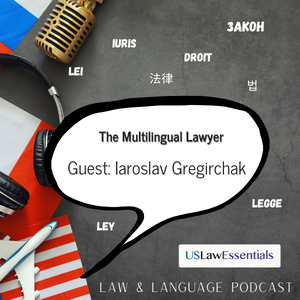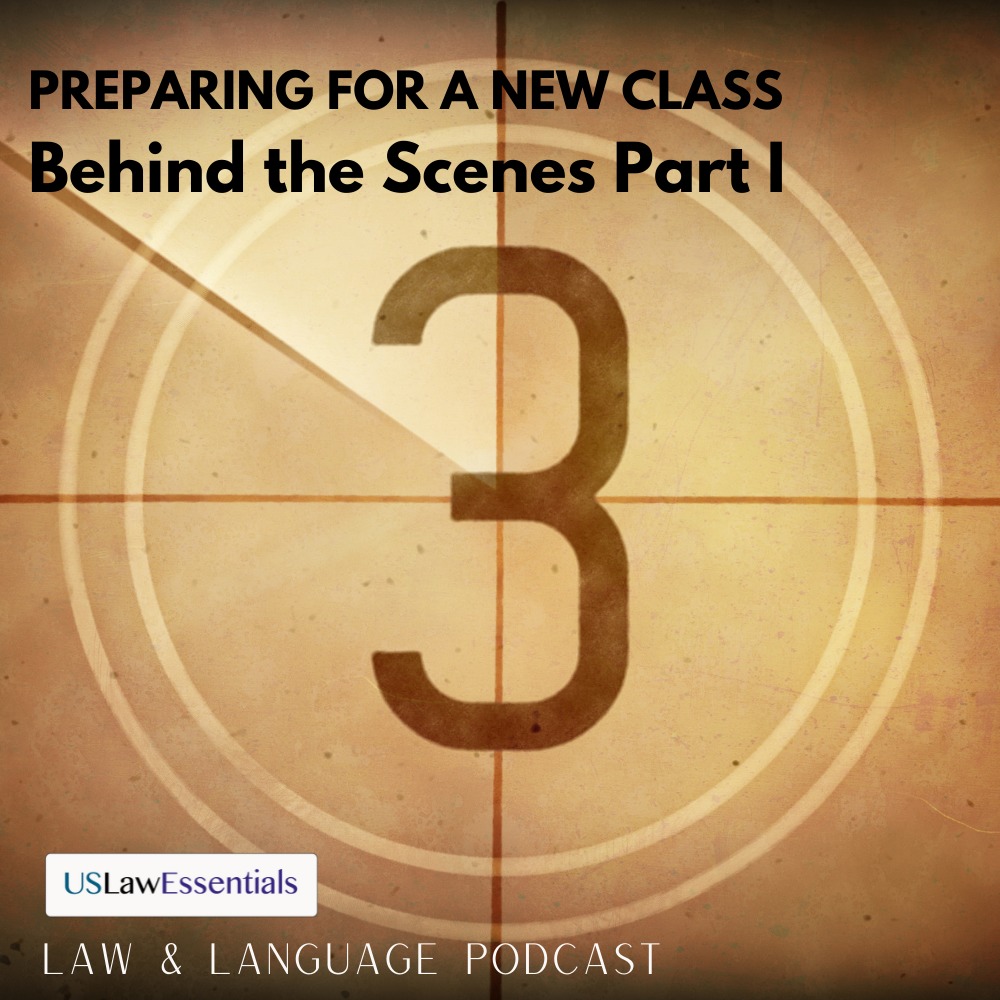Speaker 0 00:00:00 I wanna ask you sort of a philosophical question.
Speaker 1 00:00:04 Yeah.
Speaker 0 00:00:05 Steve, what does it mean to know a vocabulary word?
Speaker 1 00:00:11 Oh, wow. That, that is a philoso
Speaker 2 00:00:15 Yay. All presence, having business Before the honor, the Supreme Court of United States respond.
Speaker 0 00:00:22 Welcome to the US Law Centrals Law and Language Podcast, the legal English podcast for non-native English speakers that helps you improve your English listening, improve your legal English vocabulary, and build your knowledge of American legal culture. Hi, this is Daniel. And before we begin today's episode, I wanna remind you that US Law Centrals offers online courses in legal, English and online courses in US law. Our courses are designed for international attorneys, students, translators, and bar candidates. If you have any questions, please contact Daniel
[email protected]. Also, please visit
[email protected] and join us on Facebook and LinkedIn. Welcome to the US Law Centrals Law and Language Podcast. I'm Daniel Edelson.
Speaker 1 00:01:20 And I'm Steven Horowitz.
Speaker 0 00:01:22 And today we're continuing our series on legal English vocabulary in which we talk about vocabulary that has both a regular English meaning and also a legal English meaning, And today's word, Steve, what is it?
Speaker 1 00:01:39 Action.
Speaker 0 00:01:41 Action.
Speaker 1 00:01:42 Yeah, like lights, camera, action. Ooh,
Speaker 0 00:01:45 In camera. That also would be a good one. But today we're only gonna focus on action, right,
Speaker 1 00:01:50 <laugh>? Yeah. No, but I was saying lights, camera, action. You know, like in the movies, right? Isn't that what you mean by action? Is that why we chose this word?
Speaker 0 00:01:58 It could be, yeah. All right. But Steve, before we talk about action, I want to ask you sort of a philosophical question.
Speaker 1 00:02:06 Yeah.
Speaker 0 00:02:08 Steve, what does it mean to know a vocabulary word?
Speaker 1 00:02:13 Oh, wow. That, that is a philosophical question. Um, because normally we think of knowing a word means you look up the definition and you know the word,
Speaker 0 00:02:23 But, Okay, good. That's good,
Speaker 1 00:02:26 Dan. There's so much more to, to knowing a word. There's, knowing when to use it. There's, knowing when not to use it. There's knowing what forms of it you can use. There's knowing, uh, you know, what it sounds like, or if there's different pronunciations, Ah, all of that stuff. It's, it can get very complicated. And if you don't know all that, then you're not gonna feel so confident or fluent in your, in your use of the word. And,
Speaker 0 00:02:51 Yeah. And I, I think action is a good example of this. So let's talk about the, the regular meaning of action.
Speaker 1 00:03:01 Well, you know what they say, for every action there is an equal and opposite reaction.
Speaker 0 00:03:06 Who said that? <laugh>. Okay. I,
Speaker 1 00:03:08 I don't know. Some, I think, I think some physicist
Speaker 0 00:03:11 <laugh>. Um, alright. So we know that action generally refers to doing something, some kind of activity. So we might say, you know, an action movie would be a movie that has a lot of things happening. Maybe it might be very violent, or there might be car chases. So sort of an exciting movie, right?
Speaker 1 00:03:33 Yeah. And then when I was growing up in, in, in English class, they would always teach us that a verb is an action word.
Speaker 0 00:03:40 Ooh. Good, good, good. Yeah. Yeah. And when you write your resume, you should use a lot of action words to talk about the things you've done in your life.
Speaker 1 00:03:49 Uhhuh, <affirmative>. And then like, if, if there's something that you, that you feel passionately about, and maybe you think there's something that's unjust or unfair in society, we say you should take action.
Speaker 0 00:04:00 Ooh, that's great. That's great. Right? So there's taking action and there's action movies. So did, do you think I sort of un I'm starting to understand the word now cause I can use it in different,
Speaker 1 00:04:12 Yeah, yeah. I think, I think we've got it. So is this what it means in legal English too, you think?
Speaker 0 00:04:17 No, now it, now it gets a lot different. Um, and action refers to a lawsuit, a case.
Speaker 1 00:04:30 Oh, you mean like, so if you say, I'm gonna bring a lawsuit against you, I could just say, I'm gonna bring an action against you. I
Speaker 0 00:04:36 Think it would work in that sense. Action could, re action would be, um, a synonym for, for lawsuit. Um, so for example, if you study civil procedure in the United States, the rules for civil procedure will often refer to the case as an an action.
Speaker 1 00:05:01 Oh. That, like that movie, A civil action, uh, starring John Travolta, which is the story about a lawyer and this big lawsuit, uh, for pollution by, by a couple companies.
Speaker 0 00:05:12 Right, Right. So in that case, um, there, there might have been a play on words by the author in terms of, um, the, the reference to civil, but that word action is referring to, to, uh, to, to a, to a lawsuit. So, and along the lines of what you're saying about knowing a word, it, it's kind of interesting how this word action comes up in the legal English context. So we could say, Okay, um, after, after Steve broke the contract, Daniel brought a legal action against him,
Speaker 1 00:05:54 But we wouldn't say Daniel acted against him.
Speaker 0 00:05:59 Right. That would, that would sort of just have the regular meaning and it wouldn't necessarily refer to, to a lawsuit. And you, you'll also sometimes see, um, lawyers or course referring to a cause of action.
Speaker 1 00:06:16 Oh, yeah. I remember in law school, sometimes the professor would describe a situation and say, Would, would this person have a cause of action against this other person?
Speaker 0 00:06:29 Right. Right. So your professor gives you a certain set of facts and say, Okay, under these facts, is there a legal basis to bring a lawsuit against the other person?
Speaker 1 00:06:42 And that would be a cause of action.
Speaker 0 00:06:44 Right, Right.
Speaker 1 00:06:45 So Dan, I I'm really glad you decided to take action and, and choose this as the legal English vocabulary word for this episode.
Speaker 0 00:06:54 I appreciate that, Steve. You know, it might have not, it might not have been as, uh, dramatic and exciting as an action movie, but I think it's, um, I, I find it kind of fulfilling and fun when you're able to make a vocabulary word part of your own vocabulary, so you start to really know the word.
Speaker 1 00:07:13 Yeah. And I think people appreciate it, so they won't bring any actions against us.
Speaker 0 00:07:17 Well, I certainly hope not. But anyway, Steve, thanks again and stay essential.
Speaker 1 00:07:21 Stay essential, Dan.


